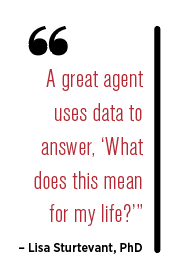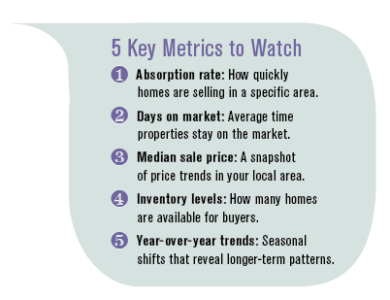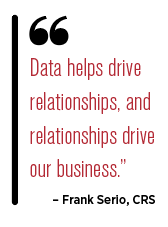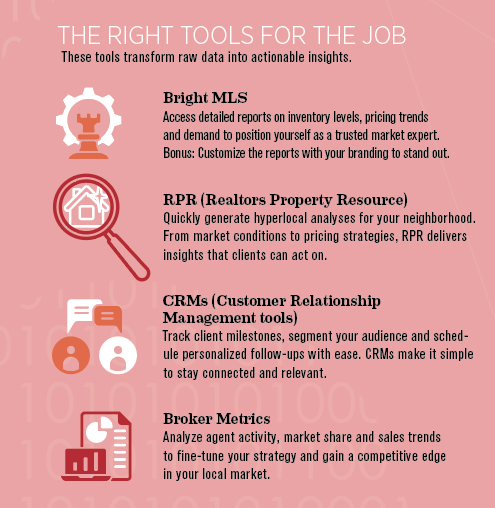By Hannah Owens
Clients often hear sweeping national headlines: “Interest rates are climbing” or “Home prices are dropping.” But what they really need is local, actionable advice—something that directly answers the question, “What does this mean for me?”
By leveraging data, agents can eliminate stress for their clients, build trust and position themselves as experts. As Frank Serio, CRS, with The Serio Team of Monument Sotheby’s International Realty Costal Division in Bethany Beach, Delaware, explains, “Data helps drive relationships, and relationships drive our business.”
Data is more than numbers—it’s the key to making personal connections and creating marketing campaigns that connect, convert and build lasting relationships. Here’s how to turn data into your greatest asset.

Where You Get Your Data Matters
Not all data is created equal. For real estate agents, having access to accurate, timely and hyperlocal insights is the foundation of delivering advice that clients can trust. National trends might make headlines, but when buyers and sellers ask, “What does this mean for me?” they need answers based on their neighborhood—not the national average.
One of the best sources for this level of insight? The local MLS. Platforms like Bright MLS provide in-depth reports on key market factors such as inventory levels, pricing trends and home demand, helping agents position themselves as local experts.
“When analyzing market conditions, it’s easy to focus on the past month or two, but year-over-year (YOY) data is far more reliable,” says Lisa Sturtevant, PhD, chief economist at Bright MLS. “Month-to-month changes can be influenced by short-term fluctuations, like seasonality or unusual market activity. Year-over-year comparisons give you a better sense of how the market has shifted in a meaningful way.”
Serio agrees: “Clients often ask, ‘What’s changed?’ [YOY] data allows you to confidently answer that question. Clients don’t just want numbers; they want context.”
By using high-quality data from trusted sources, agents can cut through market noise and offer clear, actionable insights that help their clients move forward with confidence.

Telling a Compelling Story
Sturtevant also emphasizes the importance of knowing how to interpret and combine data from multiple sources. “A great agent uses data to answer, ‘What does this mean for my life?’ Put the data together in a way that tells the story you want to tell—be the expert,” she says. For example, blending data on local inventory with national mortgage trends can create a narrative that helps clients see the bigger picture while focusing on their specific market.
Real estate is asymmetric—clients experience buying or selling as a rare, emotional event, while agents navigate it daily. “Answer logical questions emotionally and emotional questions logically,” advises Serio. A hesitant seller might need data to show rising prices, while an anxious first-time buyer may need reassurance tied to long-term appreciation trends.
How Data Drives Marketing Strategy
Clients want to feel like more than just numbers on a spreadsheet. That’s where personalization comes in. By using data-driven tools, agents can create marketing campaigns that speak directly to individual needs and situations.

Customer Relationship Management (CRM) systems are one of the most powerful tools in an agent’s arsenal. These platforms allow you to segment your audience based on life stages, demographics or preferences. “Knowing your client’s milestones—like expanding their family or retiring—helps you tailor your approach,” says Sturtevant. For example, you might send a new parent a market update for a community with larger homes or offer downsizing tips to retirees.
Serio also highlights the power of personal touches: “Sending ‘Happy Home Anniversary’ cards or following up on milestones isn’t just nice—it’s a reminder that you’re invested in your clients’ lives.” These seemingly small actions, driven by data, can build long-term loyalty.
At the heart of every transaction is a person, not just a statistic. “You need IQ to understand the market, but EQ to connect with your clients,” says Serio. Whether calming a nervous first-time buyer or helping a seller prepare for inspections, emotional intelligence is key.
With the right data and a personal touch, you’re not just selling homes—you’re building trust, solving problems and shaping the future of your clients’ lives.









